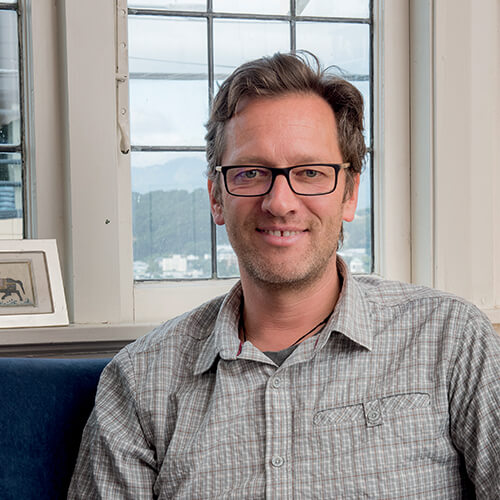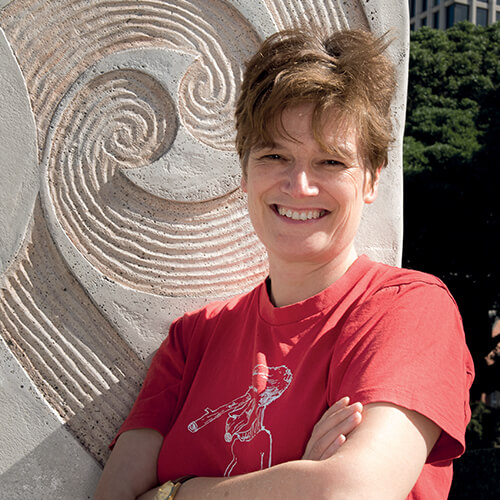This allows us to forge our own pathways to learn and use te reo Māori in a modern context. Two of our academics identify some of the opportunities as well as challenges they have discovered through their research.
Dr Joost de Bruin

In Aotearoa New Zealand there is a range of Māori language media that people can engage with: two Māori television channels, more than 20 iwi radio stations that can be accessed online, te reo Māori groups on social media, Māori language phone apps, numerous online resources and dictionaries such as the one Māmari Stephens has helped to develop (see below).
An important topic of discussion is whether the increased availability of Māori language media has made learning the language easier. In collaboration with the Ngāpuhi radio station Tautoko FM in Mangamuka (Te Tai Tokerau/Northland), a team of researchers and I carried out an audience research project on language learning and Māori media.
For all the people interviewed, learning te reo Māori had been a complicated and difficult process. The journey of learning a language presents exciting opportunities but also obstacles for Maori. As indigenous peoples, they find themselves in a situation in which they have to reconnect with their own language because it was taken away through assimilatory practices of colonisation. Barriers to language learning are numerous and ever-present: doubt about whether te reo Māori will be useful in their lives, lack of confidence about learning a second language and making time for learning in a daily context where there are more immediate challenges to be faced.
We found that people who were in a position to adopt a focused approach were the most successful learners. This approach included scanning the media for te reo Māori content at the right level, carefully planning when to consume these media and finding groups for support. To quote David Ihimaera, one of our participants, “You may not be a beginner, but you’re not a fluent speaker, so you’re trying to gauge where to find a place. And for me, I’ve had a look at different shows on TV and Ako [on Māori Television] really fits, it kind of challenges me and I’m learning all the time.” Under the right circumstances, the opportunities of the digital age allow learners to create their own pathways and derive a sense of empowerment from their journey learning te reo Māori.
An important goal of the project was to support Tautoko FM with catering its programming to the needs and wishes of listeners learning te reo Māori. Apart from academic publications, the project resulted in a ‘knowledge base’ for Tautoko FM, containing a report about the project, interview material, relevant academic literature and toolkits on how to do audience research. This toolkit has been used to develop programming and to design research that will benefit the station in the future.
Māmari Stephens

In the digital age, new English words and phrases seem to be popping into our vocabularies every day. ‘Alternative facts’, ‘liberal snowflake’ and ‘microaggressions’ are a few examples of words, phrases and acronyms that get created, picked up, used and then sometimes discarded, all around the English-speaking world.
Word usage can tell us interesting things about any language and the people who create that language. Dictionaries can tell only part of that story. One of the great benefits of the digital environment is that it has become easier to explore how Māori words have been used in the past and how they are being used now. One online resource, the Legal Māori Resource Hub, provides an accessible way to explore not just word definitions but word histories and contexts that can help Māori language users decide how to use vocabulary, even beyond the legal sphere.
The Legal Māori Resource Hub is the online environment for the research outputs of the Legal Māori Project I co-lead at the School of Law, including an online version of He Papakupu Reo Ture: A Dictionary of Māori Legal Terms. It lets users browse contemporary and historical Māori language texts, look up word meanings and test new or old Māori words against an enormous bank of texts printed between 1828 and 2009.
At approximately eight million words, the corpus section of the Hub is the largest known structured corpus of the Māori language. Regardless of expertise, if anyone would like to know about a word in te reo Māori, chances are they will find examples of its use. They can see how the word sits inside a sentence and how its use might have changed over the course of nearly 200 years. They can then click through to any, or all, of the digitised source texts and often, scans of the original text, to see how the word is used in its full context. If the word is a legal term, they can explore how it appears in the Hub dictionary.
But let a real-life user tell you how she found the increased functionality of the Hub, compared with the printed dictionary (which we still love, of course):
“WOW […] just wow. I put in ‘utu’ and up popped the different variations of how it’s used. But the coolest thing of all—clicking on the code that indicates the source of the example and then being able to see where it’s come from, not only that, but I can then view the full text if I want to or even an image of the text I can pin to Pinterest. Whaaaaat! That was a researcher’s and reo speaker’s dream come true right there (sorry I’m not a lawyer, LOL). Very proud of all involved and just think it’s wonderful.”
We are now working towards the next edition of the printed dictionary, which will lead to changes in the Hub, and our next development is hoped to be a handy app. Watch this digital wordspace!
